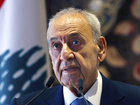Prime Minister-designate Najib Mikati is willing to make concessions to President Michel Aoun, al-Akhbar newspaper reported.
The daily said Thursday that it had learned that Mikati does not mind letting Aoun choose the names of the two ministers who will replace the minister of economy and the minister of the displaced.
 Full Story
Full Story
Even as he battles Lebanon's summer heat without air-conditioning, Judge Faysal Makki tries not to drink too much water because the toilets at the Justice Palace are broken.
 Full Story
Full Story
A White House statement said U.S. President Joe Biden and Israeli Prime Minister Yair Lapid have discussed negotiations to resolve border issues between Israel and Lebanon.
"The President also emphasized the importance of concluding the maritime boundary negotiations between Israel and Lebanon in the coming weeks," the U.S. statement said.
 Full Story
Full Story
The U.N. Security Council has unanimously approved a resolution strongly condemning harassment, intimidation, attacks and restrictions against the U.N. peacekeeping force in southern Lebanon.
It also called on Lebanese authorities to accelerate deployment of ground and naval forces to the area, which borders Israel.
 Full Story
Full Story
Forty years since Hezbollah was founded at the height of Israel's 1982 invasion of Lebanon, the group has morphed from a ragtag organization to the largest and most heavily armed militant group in the Middle East.
The Iranian-armed and funded Hezbollah, which has marked the anniversary with ceremonies in its strongholds in recent weeks, dominates Lebanon's politics and plays an instrumental role in spreading Tehran's influence throughout the Arab world.
 Full Story
Full Story
Parliament Speaker Nabih Berri on Wednesday lashed out at President Michel Aoun and the Free Patriotic Movement over several issues, in a speech marking the 44th anniversary of the disappearance of Amal Movement founder Imam Moussa Sadr.
“We remind those trying to take Lebanon back to the pre-Taef era that parliament is the only side entrusted with interpreting the constitution,” Berri said, referring to the controversy over whether or not the caretaker cabinet can assume the president’s powers in the event of a presidential vacuum.
 Full Story
Full Story
U.S. mediator Amos Hochstein has informed Lebanese officials that he will resume his meetings over the sea border demarcation file in the next few days, al-Akhbar newspaper reported on Wednesday.
He also told them that he “will not be able to give an answer regarding the Lebanese proposal before the end of this week.”
 Full Story
Full Story
Prime Minister-designate Najib Mikati met Wednesday in Baabda with President Michel Aoun over the issue of the new government.
Speaking to reporters as he entered the meeting, Mikati quipped that the government’s formation decrees cannot be issued today seeing as Speaker Nabih Berri “is in the South” to deliver a speech marking the 44th anniversary of the disappearance of Imam Moussa al-Sadr.
 Full Story
Full Story
Parliament Speaker Nabih Berri is dismayed by Prime Minister-designate Najib Mikati's unwillingness to form a government, sources said.
The sources told al-Akhbar newspaper, in remarks published Wednesday, that Mikati's resorting to Dar al-Fatwa and his mobilization of the Sunnis have deepened the disagreement between the PM and President Michel Aoun.
 Full Story
Full Story
Internet shutdowns rippled through cash-strapped Lebanon on Tuesday after employees of the country's state-owned telecom company went on strike, demanding higher wages.
It was the latest reflection of one of the world's worst economic disasters, which has pulled three quarters of Lebanon's 6 million people into poverty. The Lebanese pound in three years has lost over 90 percent of its value against the U.S. dollar.
 Full Story
Full Story



